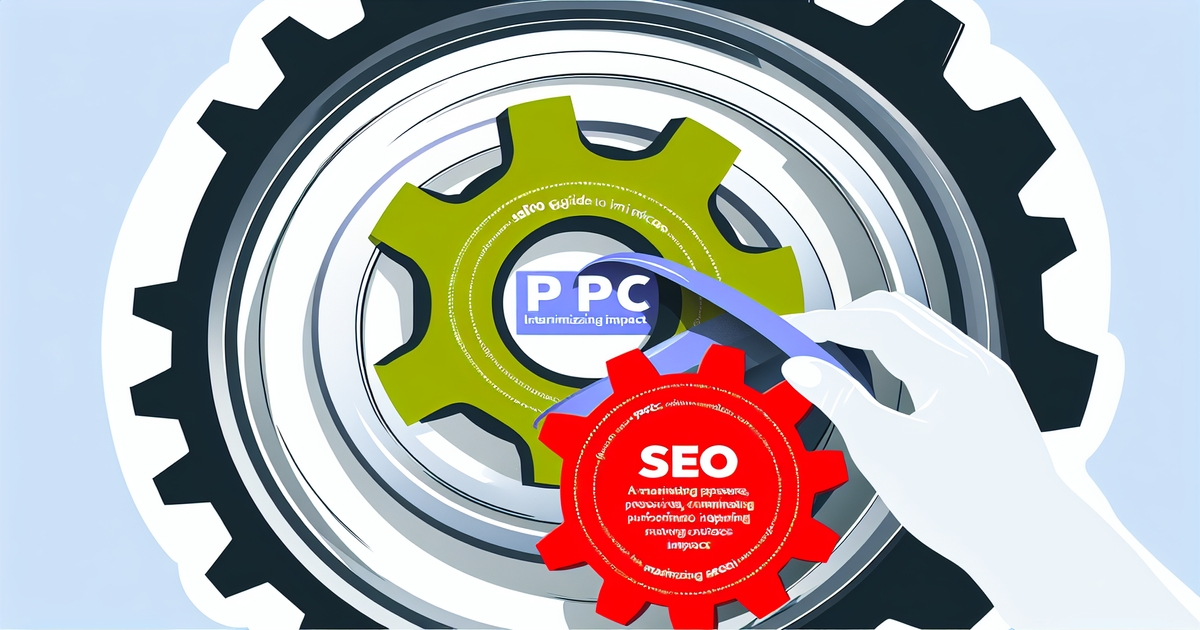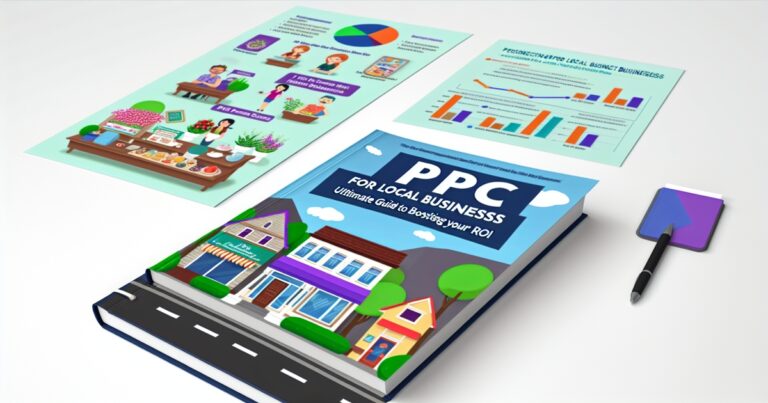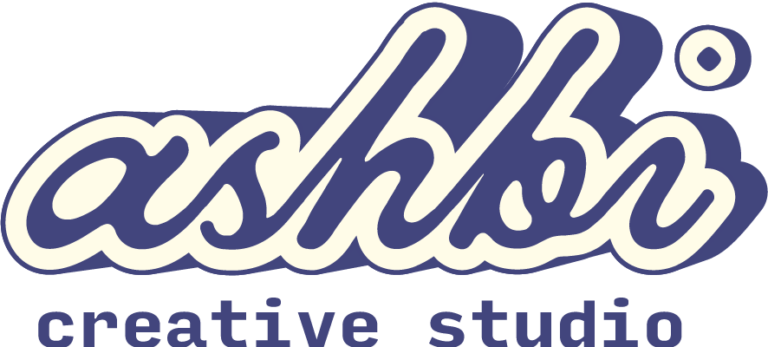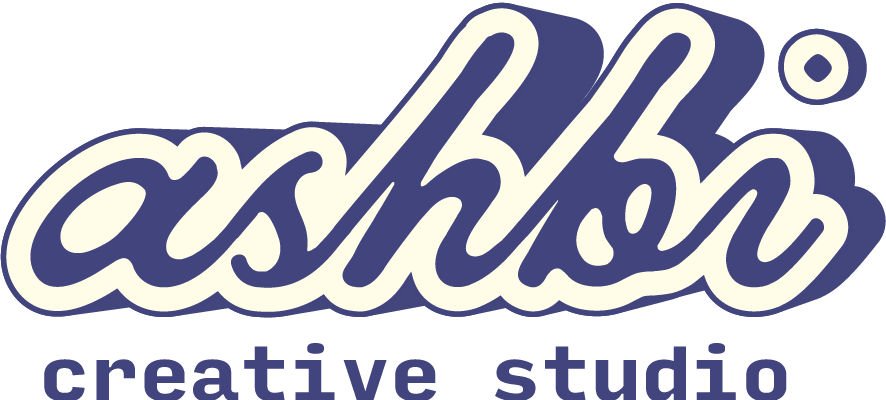In the ever-evolving digital landscape, mastering both pay-per-click (PPC) and search engine optimization (SEO) has become a golden ticket for businesses aiming to skyrocket their online visibility. Historically, marketers would often silo these strategies, focusing on either immediate traffic boosts from PPC or the gradual growth provided by SEO. However, blending these two powerhouses, SEO campaigns and brand presence, opens up a realm of synergy that can significantly amplify your marketing results, enhancing organic visibility and avoiding cannibalization. This approach not only enhances your brand’s presence across various platforms but also optimizes your overall investment in digital marketing.
Key Takeaways
- Integrating PPC with SEO strategies can significantly enhance your online visibility and drive more targeted traffic to your website. Start by understanding the unique strengths and weaknesses of each approach.
- For a successful integration, align your PPC and SEO efforts by using consistent keywords and content strategies across both channels. This will improve your overall search engine presence.
- Choosing the right platforms for your PPC campaigns is crucial. Consider where your target audience spends their time online and align your PPC efforts with those platforms for maximum impact.
- Budget wisely for PPC campaigns by taking into account the competitive landscape of your keywords and the potential ROI. Use SEO insights to prioritize high-performing keywords that could yield better results with a lower investment.
- Optimize your PPC campaigns with SEO techniques by focusing on keyword relevance, quality content, and landing page optimization. This will not only improve your ad performance but also enhance user experience.
- Leverage data from both PPC and SEO campaigns to refine your strategy over time. Analyzing performance data can reveal insights that help you optimize your integrated approach for better results.
Understanding PPC and SEO
Key Differences
PPC and SEO serve unique roles in digital marketing. PPC offers immediate results. You can see traffic on your website from seo campaigns and seo work as soon as your ads go live on the search engine. In contrast, SEO is a long-term strategy. It takes time to climb the search engine rankings.
SEO drives organic traffic to your website without direct payment for clicks. On the other hand, PPC relies on paid traffic through advertisements to work in ways that bring visitors to a website in terms. These ads often appear above organic search results, giving them prime visibility.
Essential Similarities
Despite their differences, PPC and SEO share common goals. Both business terms aim to increase visibility and drive traffic to websites.
Keyword research is crucial for both strategies’ success. Finding the right keywords helps target specific audiences effectively.
Tracking and analytics are also vital in both cases. They help you understand what’s working on your website in business terms so you can optimize performance over time.
Impact on Each Other
Integrating PPC with SEO can lead to significant benefits for your business website in terms of overall digital marketing strategy. High-performing keywords from your PPC campaigns provide valuable insights into what potential customers are searching for. This information can inform your SEO content strategy, helping you create more effective content that ranks well organically.
Improved SEO rankings for website terms have a positive effect on PPC campaigns too. As your site becomes more authoritative in search engines, it may decrease cost-per-click (CPC) rates in PPC. This happens because Google rewards relevance; higher-ranking sites are seen as more relevant.
Unified messaging across both channels enhances brand consistency. It ensures that whether someone sees an ad or an organic listing, terms are consistent. they receive the same core message about who you are and what value you offer.
Integrating Strategies
Synergizing for ROI
Combining SEO and PPC efforts can significantly reduce your marketing expenses. When you use both strategies together, you’re not just saving money; you’re also creating a more efficient campaign. This integrated approach allows for shared insights, which leads to better-targeted campaigns.
Cross-channel insights are like pieces of a puzzle. When put together, they give you a clearer picture of your audience’s behavior. This knowledge helps in crafting campaigns that resonate more with your target market. As a result, integrated strategies improve overall conversion rates.
Comprehensive Keyword Strategy
A key component of integrating PPC with SEO is developing a comprehensive keyword strategy. Start by identifying high-intent keywords that signal strong buyer interest. These are gold mines for both SEO and PPC because they attract users ready to convert.
Next, explore the power of long-tail keywords. They offer two main benefits:
- Niche targeting
- Reduced competition
By focusing on specific phrases related to your product or service, you can capture audiences looking for exactly what you offer without battling as much competition.
Don’t forget to analyze competitor keyword strategies too. Look for gaps and opportunities where your competitors might be missing out or areas they’ve overlooked. This analysis can reveal valuable insights into how you can differentiate and position yourself in the market.
Harmonious Marketing Plan
Creating a harmonious marketing plan means aligning content themes across SEO and PPC for cohesive messaging. Your audience will encounter consistent messages whether they come through organic search or paid ads, reinforcing brand recognition and trust.
Scheduling PPC campaigns to support SEO-driven content launches is another strategic move. For example:
- Launch an informative blog post optimized for search engines.
- Follow up with targeted ads promoting the blog’s key points or offering additional incentives.
This one-two punch maximizes exposure and engagement around new content releases.
Leveraging social media signals plays a crucial role in boosting both SEO and PPC performance as well. Here’s how:
- Share content widely on social platforms.
- Engage with followers through comments and shares.
- Use social listening tools to discover trending topics related to your industry.
Integrating these digital strategies creates an ecosystem where each element supports the other, leading to greater visibility online.
Platform Choices for PPC
Google Ads
Google Ads is a powerful tool for immediate visibility in search results. By leveraging this platform, businesses can appear right where their potential customers are looking. It’s not just about being seen, though. The real magic happens when you use ad extensions.
Ad extensions make your ads more appealing and informative. This leads to higher click-through rates (CTR). Imagine seeing an ad with quick links to different sections of a website or testimonials right there in the search results. It’s compelling and encourages clicks.
Optimizing your Quality Score is another critical strategy on Google Ads. A high Quality Score means lower costs per click (CPC) and better positioning of your ads. Think of it as Google’s way of rewarding ads that are relevant and useful to users.
Bing Ads
Bing Ads offers unique opportunities not found on Google. One key advantage is reaching specific demographics that may be overlooked by competitors focusing solely on Google Ads.
Bing generally has lower CPCs compared to Google. This means your budget can go further, allowing for more extensive testing or broader campaigns.
For B2B campaigns, Bing’s LinkedIn Profile Targeting stands out as a unique feature. You can target professionals based on their company, job function, and industry directly through Bing ads.
Both platforms play critical roles in integrating PPC with SEO strategies effectively used by PPC teams.
Budgeting for PPC Campaigns
Allocating Funds
After choosing the right platforms for your PPC campaigns, it’s crucial to allocate your budget wisely. Balancing your budget based on campaign goals, seasonality, and performance data ensures you’re investing where it counts. Start by setting aside funds for different times of the year when your products or services are in high demand.
Prioritize spending on keywords and audiences that have shown high conversion rates. This means putting more money into what works and less into what doesn’t. For example, if you notice certain keywords bring in a lot of sales during spring, increase their budget accordingly.
It’s also smart to reallocate funds from underperforming campaigns to those that succeed. Let’s say one of your PPC ads isn’t doing well despite several adjustments. It might be time to move some of its budget to another ad that’s performing better.
Maximizing ROI
To get the most out of every dollar spent on PPC marketing, closely track conversion rates. This helps identify which strategies are bringing in profits so you can do more of what works. Suppose one landing page converts 10% of visitors while another only does 5%. Focusing more resources on the first page makes sense.
A/B testing is a powerful tool here too. By creating two versions of a landing page and comparing results, you can see which elements lead to higher conversions—be it headlines, images, or call-to-action buttons.
Refining keyword lists based on performance data is an ongoing task but essential for maximizing ROI from your PPC strategy. If certain keywords consistently perform poorly with low returns, consider pausing them or adjusting bids downwards.
- Always balance budgets according to campaign objectives.
- Prioritize investments in successful areas.
- Reallocate funds intelligently between campaigns.
Tracking conversions will guide profitable decisions:
- Identify winning strategies through close monitoring. 2 .Use A/B testing for optimizing user experience. 3 .Continuously update keyword lists following performance insights.
Optimizing PPC with SEO Techniques
Enhancing Traffic
After setting a budget for PPC campaigns, the next step involves optimizing traffic. During peak shopping seasons or product launches, aggressive PPC tactics can be highly effective. This approach ensures your ads are visible when potential customers are most active online.
Optimizing website content is crucial too. Focus on both head terms and long-tail queries. Head terms are broad and often more competitive, while long-tail queries are specific and less contested. By targeting both, you increase your chances of attracting a wide range of visitors.
Leveraging retargeting ads plays a significant role in bringing previous visitors back to the site. These ads remind users of what they viewed on your site, encouraging them to return. This strategy is particularly useful for converting interest into action.
Improving User Experience
The user experience starts with landing pages that match ad copy and keywords precisely. If someone clicks an ad about “solid SEO strategies” but lands on a page discussing general digital marketing tips, confusion arises. Ensure each landing page delivers exactly what was promised in the ad.
Page load times significantly impact bounce rates; faster pages retain more visitors. Technical SEO work here is essential—optimize images, leverage browser caching, and minimize JavaScript loading times whenever possible.
Lastly, creating engaging, valuable content aligned with user intent solidifies the connection between your PPC efforts and organic rankings in SERPs (Search Engine Result Pages). When users find genuinely helpful information that matches their search intent after clicking an ad or organic listing alike—satisfaction increases along with the likelihood of conversions.
By integrating solid PPC tactics with strategic SEO campaigns effectively:
- You enhance visibility across different channels.
- Improve overall user engagement.
- Increase conversion opportunities by aligning paid advertising efforts closely with organic content strategies.
This synergy not only maximizes return on investment but also builds a cohesive online presence that resonates well with target audiences across various stages of their buying journey.
Leveraging Data for Enhanced Performance
Utilizing PPC Data for SEO
PPC campaigns give us rich data. This data can improve SEO strategies. Look at PPC ad copies that have high click-through rates (CTRs). These ads connect well with audiences.
Use these insights for your SEO meta descriptions. It makes sense, right? If people click on a PPC ad, they might also click on an organic listing with similar wording.
Conversion data from PPC is gold. It shows what content leads to actions like sales or sign-ups. Use this to decide which SEO content needs updates or creation first.
Sometimes, keywords don’t perform well in PPC campaigns. Don’t ignore them! These are opportunities for SEO improvement. Focus your efforts here and monitor the changes.
Combined Data Analysis
Integrating analytics from both channels offers a full picture of digital performance.
This approach helps spot trends in user behavior across the website. Understanding these trends allows you to make informed decisions about where to focus your efforts across both paid and organic search marketing.
Evaluating the customer journey is crucial too. See how users move from seeing a paid ad to visiting your site organically.
- What pages do they visit?
- How long do they stay?
These insights guide cross-channel optimizations, making sure every touchpoint aligns with user expectations and business goals.
Boosting Brand Visibility
Unified Campaigns
Integrating PPC with SEO boosts your brand’s online visibility. Launch coordinated promotions across both channels for a stronger impact. This approach ensures that your marketing message is consistent, whether people find you through paid ads or organic search results.
Use the same visuals and messaging across SEO and PPC. This consistency helps in strengthening brand recall among your audience. People are more likely to remember your brand when they see it repeatedly, presented in a similar way.
Measure how these unified campaigns affect web traffic and conversions. Combining data from both SEO and PPC gives you a clearer picture of their overall impact on your brand presence.
Remarketing Strategies
Remarketing allows you to reconnect with people who’ve interacted with your site before but didn’t convert. Use remarketing lists for search ads (RLSA) to target these individuals with tailored messages based on their past interactions.
Consider using insights from SEO about what content is most popular as themes for your PPC remarketing campaigns. For example, if blog posts about “tips for first-time home buyers” are getting lots of organic traffic, create PPC ads focusing on services or products for new homeowners.
Segment audiences based on their level of engagement for more personalized remarketing ads. You can categorize them into groups such as “visited once”, “frequent visitors”, or “abandoned cart”. Tailoring messages to each group increases the chances of conversion.
Advanced Integration Examples
Testing New Keywords
Integrating PPC with SEO opens up a strategic playground for testing new keywords. This approach allows marketers to pilot unproven keywords through PPC before diving deep into SEO efforts. It’s like dipping your toes in the water before taking the plunge.
By running small-scale PPC campaigns, you can quickly gather data on how these new keywords perform. You’re not just shooting in the dark; you’re making informed decisions based on real-time feedback. Through rapid testing of ad copy variations, you refine your keyword targeting strategies without committing extensive resources upfront.
PPC also offers a treasure trove of data through search query reports. These reports can uncover new keyword opportunities that might have flown under your radar. Imagine finding a gem hidden within the rough—these insights could be game-changers for your SEO strategy.
Decision-Making Insights
The integration of PPC and SEO doesn’t just stop at keyword experimentation; it extends into smarter decision-making insights as well. By comparing the cost per acquisition (CPA) across channels, you gain valuable perspectives on where to allocate your budget more effectively.
For instance, if PPC is bringing in leads at a lower CPA than organic search, it might make sense to increase investment there temporarily while optimizing SEO tactics for better performance. However, this isn’t about putting all eggs in one basket but rather balancing them wisely between both baskets—PPC and SEO.
Leveraging cross-channel performance data is crucial when planning future marketing strategies. It enables marketers to see which channels are performing best and why. If certain content types or topics are resonating more with audiences in paid ads, those insights can inform content creation for organic search optimization too.
Furthermore, using one channel’s performance metrics to optimize tactics in another channel fosters an environment of continuous improvement and synergy between PPC and SEO teams.
- For example:
- A high-performing ad headline could inspire an update to meta titles.
- Successful landing pages from PPC campaigns may highlight elements worth incorporating into broader website design or content strategy.
Managing Analytics for Integrated Campaigns
Performance Tracking
Setting up unified tracking codes is crucial. It helps you see how your efforts in PPC and SEO work together. This gives a clear picture of the campaign’s overall performance.
You should monitor KPIs like click-through rate, conversion rate, and bounce rate regularly. Doing so helps identify trends quickly. If something isn’t working, you’ll know fast.
Adjusting campaigns based on real-time data is essential. Let’s say your SEO content starts ranking well for a keyword that’s also in your PPC campaign. You might decide to lower your PPC bid for that keyword and allocate more budget elsewhere.
Informed Adjustments
Making changes based on A/B testing results from both channels can significantly improve performance. For example, if an ad performs better with one headline while a blog post does better with another, it’s worth exploring why and adjusting accordingly.
Revisiting keyword strategies is something you should do often using fresh data insights. What worked last month may not work this month due to new competitors or changes in search behavior.
Tailoring ad spend dynamically is key when market conditions change or competitors make moves. If a competitor increases their ad spend on certain keywords, you might need to respond by adjusting your strategy to stay competitive.
Summary
Integrating PPC with SEO isn’t just smart; it’s essential for turbocharging your online presence. Imagine combining the speed of a sports car (PPC) with the endurance of a marathon runner (SEO). That’s what you’re doing here—harnessing the best of both worlds for maximum impact. You’ve seen how aligning strategies, choosing the right platforms, and budgeting wisely can set you up for success. Plus, optimizing your PPC campaigns with SEO techniques and leveraging data takes your brand’s visibility to new heights.
Now, it’s time to put this knowledge into action. Dive in, mix and match strategies, and keep an eye on those analytics. Remember, the digital marketing landscape is always evolving, so stay curious, experiment, and adapt. Ready to boost your brand like never before? Let’s get cracking and make your mark in the digital world!
Frequently Asked Questions
How can PPC and SEO work together to improve my website’s visibility?
Combining PPC and SEO strategies allows you to dominate both paid and organic search results, increasing your site’s visibility. Think of it as having two fishing lines in the pond, doubling your chances of catching fish.
What are the best platforms for running PPC campaigns?
Google Ads and Bing Ads are top choices for PPC campaigns. They’re like the main stages at a music festival – where you want your ads to perform.
How do I decide on a budget for my PPC campaigns?
Start with understanding your goals and audience. It’s like planning a road trip; knowing your destination helps you figure out how much gas (budget) you’ll need.
Can SEO techniques really optimize my PPC efforts?
Absolutely! Using targeted keywords from SEO in your PPC campaigns is like adding spices to a recipe – it enhances the flavor, making your ads more appealing to search engines and users.
Why is leveraging data important in improving campaign performance?
Leveraging data lets you fine-tune strategies based on what works. It’s akin to tailoring an outfit; custom adjustments make it fit perfectly, enhancing overall performance.
How does integrating PPC with SEO boost brand visibility?
Integrating these two increases brand presence across multiple channels, similar to being broadcasted on TV while also trending online. You get the best of both worlds!
Are there any advanced examples of successful integration between PPC and SEO?
Yes! For instance, using insights from A/B testing in Google Ads can inform content creation for SEO. It’s like using feedback from rehearsals to perfect the final show.









